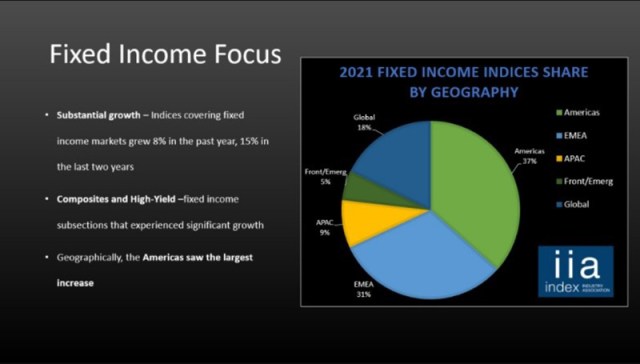[ad_1]
Sustainable investing is very much on the minds of investors across the globe. That’s the key takeaway from the Index Industry Association (IIA)’s fifth annual survey of global independent index providers.
By measuring the number of indices around the world from across asset classes, geographies, and categories, the annual IIA Benchmark Survey serves as a useful temperature check for global investors and has led us into deeper analysis of emerging areas of investor focus. IIA members continue to administer over 3 million indices globally and, with 9,000 to 10,00 exchange-traded products (ETPs), it is clear most indices are used for benchmarking purposes not for products for investment. The unprecedented growth in environmental, social and governance (ESG) indices and ongoing expansion in fixed-income indexes in recent years has created more tools for benchmarking and will provide asset managers better tools to create better investment products for investors.
This year’s survey results show the light for ESG, or sustainable investing, is still flashing green. The number of indices measuring ESG criteria jumped by 43%. That’s a record year-over-year (YoY) increase for any sector in the survey and comes on top of a 40.2% rise from 2019 to 2020. For perspective, most categories change within 5% YoY.
While not surprising, the latest survey findings, combined with other IIA research, confirm an ongoing and accelerating trend we have observed in the last few years. As global investors embrace sustainable investing strategies to an ever greater extent and regulators and policymakers sharpen their focus on ESG-related issues, the demand for reliable ESG market measures has soared. And index providers have stepped in to meet that demand.
Eye-popping ESG index growth over the past several years inspired us to launch the IIA’s first annual ESG survey of global asset managers earlier this year. The inaugural survey gathered perspectives on a range of ESG-oriented topics from about 300 asset managers in the United States and Europe. It found that 85% of these managers view ESG as a high priority for their companies. ESG prioritization is driving asset allocation, with the proportion of ESG assets in global portfolios managed by this group expected to rise from 26.7% in 12 months to 43.6% in five years.
Amid greater ESG adoption, investors want more and better tools to measure their ESG investments. Lack of quantitative data was cited as a challenge to ESG implementation by 63% of those surveyed. This year’s IIA Benchmark Survey results support these findings: Asset managers overwhelmingly want more ESG indices in asset classes beyond equities.
Investor trust is another key factor in the rapid expansion of ESG indices in the market. According to our ESG survey, 80% of respondents believe indices help them direct investment quickly to companies and sectors with strong ESG performance. Another 73% believe that indices improve comparability in ESG performance, and 78% say that indices increase their confidence in ESG data’s reliability. Amid the fast-evolving nature of many ESG issues, three quarters of respondents find that indices help them respond quickly to new ESG concerns.
Beyond ESG, our benchmark survey uncovered some additional areas for index expansion. Again, in a nod to the appeal of multi-asset strategies among investors, the number of indices measuring fixed-income markets increased by almost 8% YoY. That eclipsed the 7.1% increase in 2020.
As for ESG and fixed income, the survey found 61% more ESG indices in the fixed-income space. There was also impressive growth in high-yield bond indices and total market or composite bond indices, as well as fixed-income indices in the Americas.
Among equities categories, the thematic indices cohort was the only one other than ESG to display strong growth, with a 27.5% increase YoY, albeit from a small base. This represents something of a shift among investors away from smart beta toward more thematic investment approaches to better access emerging investing trends.
If you believe as I do that there is a lag between the creation of indices and the development and sale of such products to investors, the number of products asset managers will bring to market will be on the rise for the next several years. The results from our surveys the past two years point to ESG and fixed income as key areas for this growth. As more quantitative corporate disclosure data becomes available, better ESG benchmarks will be created, which will lead asset managers to create better investment products that reflect investors’ commitments to sustainable finance.
This is the fifth installment of a series from the Index Industry Association (IIA). The IIA will celebrate its 10th anniversary in 2022. For more information, visit the IIA website at www.indexindustry.org.
If you liked this post, don’t forget to subscribe to the Enterprising Investor.
All posts are the opinion of the author. As such, they should not be construed as investment advice, nor do the opinions expressed necessarily reflect the views of CFA Institute or the author’s employer.
Image credit: ©Getty Images / Aaron McCoy
Professional Learning for CFA Institute Members
CFA Institute members are empowered to self-determine and self-report professional learning (PL) credits earned, including content on Enterprising Investor. Members can record credits easily using their online PL tracker.
[ad_2]
Image and article originally from blogs.cfainstitute.org. Read the original article here.




